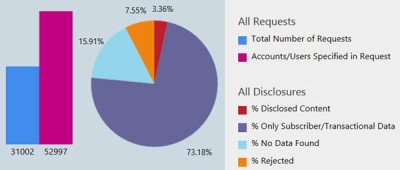Microsoft has published its bi-annual Law Enforcement Requests Report that talks about the long-help policies that Microsoft follows, in responding to requests that are received from law enforcement agencies, on customer information from all around the world. The report also mentions the security related data request that Microsoft receives from the U.S. government on the basis of national security.
Microsoft Law Enforcement Request Report
Microsoft’s bi-annual Law Enforcement Request Report has some key takeaways for you, as a reader.
1] A high percentage of such requests, do not meet Microsoft’s standard of exposing information. The report covers a period starting from July 2014 until December 2014. During this period the total number of requests that the company received is 31,002 bringing the yearly total to 65,496. The number of requests this year is lesser than what it was in the year of 2013 when requests totaled 72,279.
2] Among the request received by the company in 2014, Microsoft disclosed 3.36 percent of cases belonging to content data like email messages while non-content data like users’ names and IP addresses accumulate up to 73.17 percent of cases. The number of requests that were rejected as there were not meeting the legal requirement also increased. In 2013 the number of rejected requests was 2,105, which almost doubled this year reaching out to 4,379 in number.
3] Turkey, France, Germany, the United Kingdom and the United States government agencies had made around 70% of the requests. Another report, called as U.S. National Security Order Report , shows that Microsoft received around 1000 National Security Letters between the periods of June to December 2014.
4] The request made under the Foreign Intelligence Surveillance Act from January through June 2014 are also included in U.S. National Security Order Report where FISA court orders are subject to a six-month reporting delay. John Frank, Microsoft’s assistant general counsel and vice president for legal and corporate affairs, demand for strong changes in the government practices and data request policies that could enhance the security of product and services that is being used by millions of people all around the globe.
Says Microsoft,
“The bottom line is that while governments only request data on a very small fraction of our customers, governments are seeking to alter the balance between privacy and public safety in a way that impacts everyone,”.As we have said before, there are times when law enforcement authorities need to access data to protect the public. However, that access should be governed by the rule of law, and not by mandating backdoors or weakening the security of our products and services used by millions of law-abiding customers. This should concern all of us.”
Stay tuned to TWCN Tech News, to get the lates in the world of Microsoft and Windows.

I can only speak from perspective as a lifelong resident of the USA, but I know back in the 1950’s through onto the 1990’s, Federal and local law enforcement had staffs a lot bigger than they’ve been of late; for some time, many reductions especially for detective/investigatory positions have taken place in many USA jurisdictions.
Back when, as suggested even in movies/TV of the days, there were not only uniformed/swat phalanxes in major urban areas, but scads of one kind or another of plainclothes police, who studied records, evidence, compared patterns/histories of known offenders, dactylography, and developed leads in person in the streets to real people doing real things. There were also less “for-profit” private prisons/long term defendant-paid “supervision” programs (especially for minor offenses), and more actually penitentiary-themed jails.
But too often it seems law agencies have to make do with the internet and “scalpel action” triaged on what one can find panning online data, often like 1800’s prospectors…sure, sometimes a good bagful of nuggets are found, but look at all the mud and silt panned through to find it at random. Too often, the internet only becomes useful when a horrible thing has happened, and all energy can be focused on a more finite set of suspicious particulars, producing faster responses…while all sorts of other things build up because they appear to be incidental to planned wrongs but the effectuation hasn’t yet happened (i.e., takedowns are often more successful than preventions by apprehension).
This can lead to some agencies being pressured to respond to questions of their protective value, sometimes the reaction being “data can generally be grabbed, go pluck x-amount of random data…there, we’ve tried to be proactive”; a few times some have turned to using “focus” on mere political critics or opponents…in either case saying of those critical of such misuse: “why, you don’t support such-and-so naughtiness of the moment…do you?”, even if open source opinion or content spam forms much of the data.
Kudos to Microsoft for wanting to help where the public interest truly would be served, as evidenced by their other pro-law enforcement initiatives, and thank you for reporting on their efforts. Cheers!